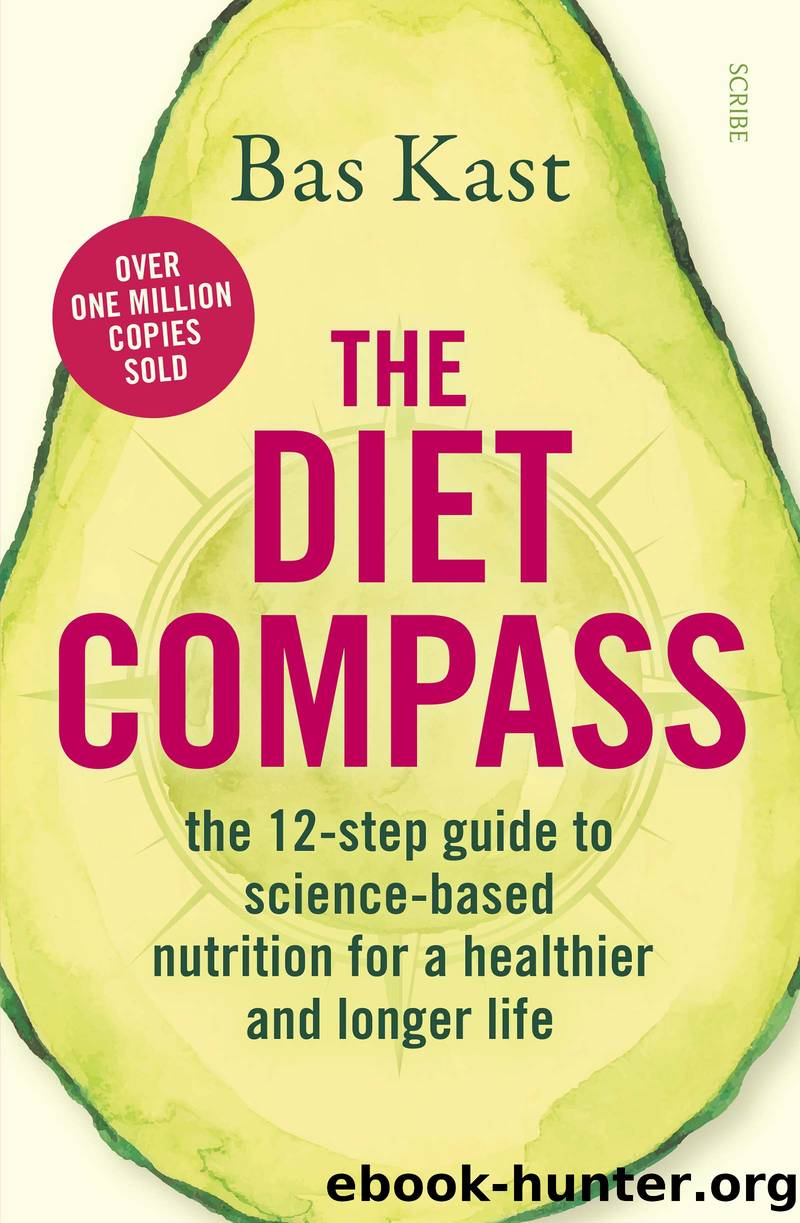The Diet Compass by Bas Kast

Author:Bas Kast
Language: eng
Format: epub
Tags: HEA048000, HEA010000, HEA049000, SCI086000, MED060000, HEA019000, MED021000, CKB039000
Publisher: Scribe Publications Pty Ltd
Published: 2021-01-05T00:00:00+00:00
Fig. 6.2 The diagram shows the percentage of all large-scale analyses published between 1950 and 2013 that indicated a protective, neutral, or harmful link to the ten main diseases associated with ageing (cardiovascular disease, cancer, type-2 diabetes, liver disease, kidney disease, diseases of the digestive system and the skeleton, sarcopenia, brain disease, and obesity or adiposity). Taking wholemeal products as an example: almost 60 per cent of all large-scale analyses between 1950 and 2013 classify wholemeal products as protecting against at least one of the geriatric conditions considered. Nearly 40 per cent of all meta-studies came to a neutral conclusion (neither protective nor harmful). Only a very small percentage of studies (4 per cent) reached the conclusion that wholemeal products might be harmful. Iâm not claiming that meta-analyses like this are the final word in questions about nutrition, but they do give us an impression of the general trend in the scientific assessment of certain food groups. This also helps to debunk senseless diet-hypes, like the current tendency to blame bread for everything, promoted by books such as Wheat Belly and Grain Brain.18
There are various reasons for this. To a certain degree, it might be due to the rather rough division of foods into undifferentiated groups (soft drinks are certainly more harmful than fruit juice; âdairy productsâ include yoghurt, butter, cheese, and, in this case, sometimes milk itself; and so on). At a more basic level, however, these contradictions are a fundamental part of the way science works. Science is not a dictatorship. Data can be interpreted and evaluated in different ways. Itâs by gradually resolving such contradictions through critique and discussion that science constantly updates and corrects itself and thus makes progress.
Each individual study, however carefully it was carried out, has its own strengths and weaknesses. Observational studies can be wide-ranging and long-term â sometimes decades long â but itâs then often difficult to pin down the crucial factor (think of the reason why coffee was considered so toxic for so long). Experiments carried out with two groups of test subjects following different diets are more scientifically rigorous, but they are by their very nature always limited in duration, which is an important factor when studying diets, whose effects are usually seen over a rather long period of time.
Then thereâs the fact that scientists are of course not infallible and sometimes make mistakes. Some researchers are heavily financed by the soft-drinks, milk, or some other industry, and, unfortunately, that dependency clearly colours some of their findings. For these and many other reasons, research can and will always yield contradictory conclusions.
Nonetheless, despite these contradictions, a general trend usually becomes apparent for each kind of food, concerning its effect on our health. Itâs this general trend that Iâve followed in this book. For example, the majority of the meta-studies (56 per cent) indicate that red and processed meats are harmful. There are many neutral studies, too, while 4 per cent still reach a positive conclusion about them. That means a person
Download
This site does not store any files on its server. We only index and link to content provided by other sites. Please contact the content providers to delete copyright contents if any and email us, we'll remove relevant links or contents immediately.
How to Be a Bawse: A Guide to Conquering Life by Lilly Singh(7462)
Deep Work by Cal Newport(7045)
The Longevity Diet by Valter Longo(5054)
The Fat Loss Plan by Joe Wicks(4895)
The Four-Pack Revolution by Chael Sonnen & Ryan Parsons(3957)
The Ultimate Bodybuilding Cookbook by Kendall Lou Schmidt(3921)
The French Women Don't Get Fat Cookbook by Mireille Guiliano(3645)
Not a Diet Book by James Smith(3400)
Super Food Family Classics by Jamie Oliver(3390)
Factfulness_Ten Reasons We're Wrong About the World_and Why Things Are Better Than You Think by Hans Rosling(3224)
Turn Up Your Fat Burn! by Alyssa Shaffer(3208)
Self-Esteem by Matthew McKay & Patrick Fanning(3129)
Tom Kerridge's Dopamine Diet: My low-carb, stay-happy way to lose weight by Kerridge Tom(3088)
Body Love by Kelly LeVeque(3044)
The Unbecoming of Mara Dyer by Michelle Hodkin(3028)
Tone Your Tummy Type by Denise Austin(2825)
The Fat Chance Cookbook by Robert H. Lustig(2822)
LL Cool J's Platinum 360 Diet and Lifestyle by LL Cool J(2722)
Men's Health Best by Men's Health Magazine(2583)
